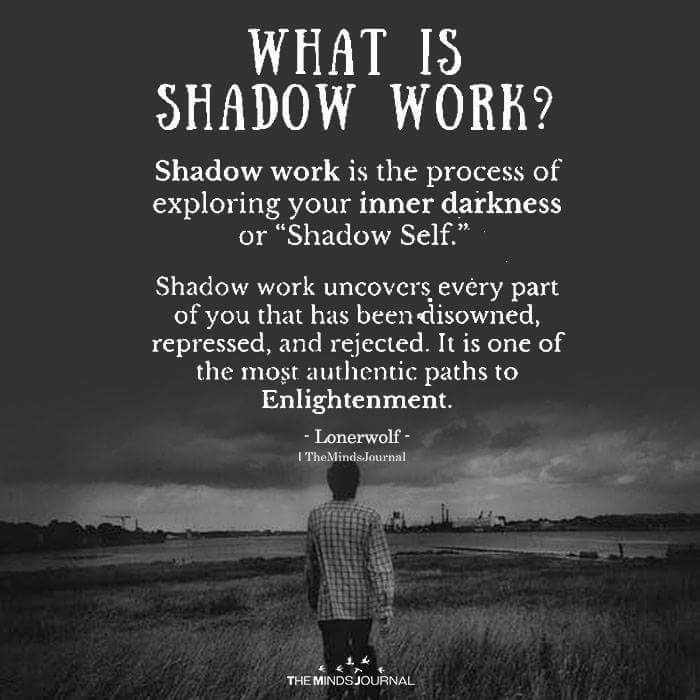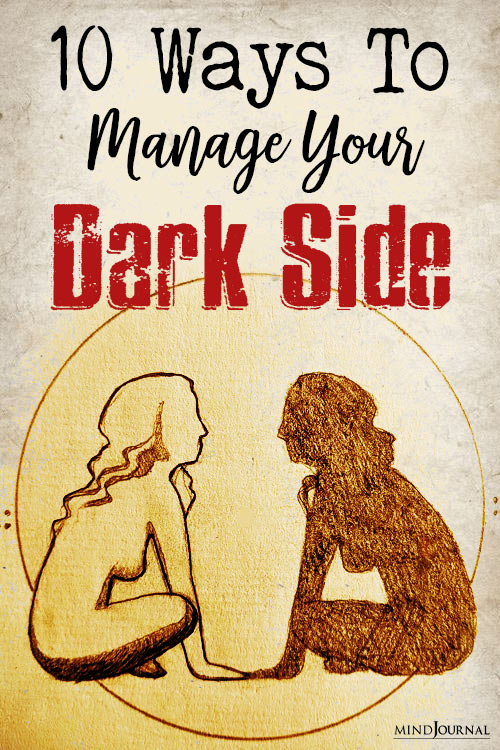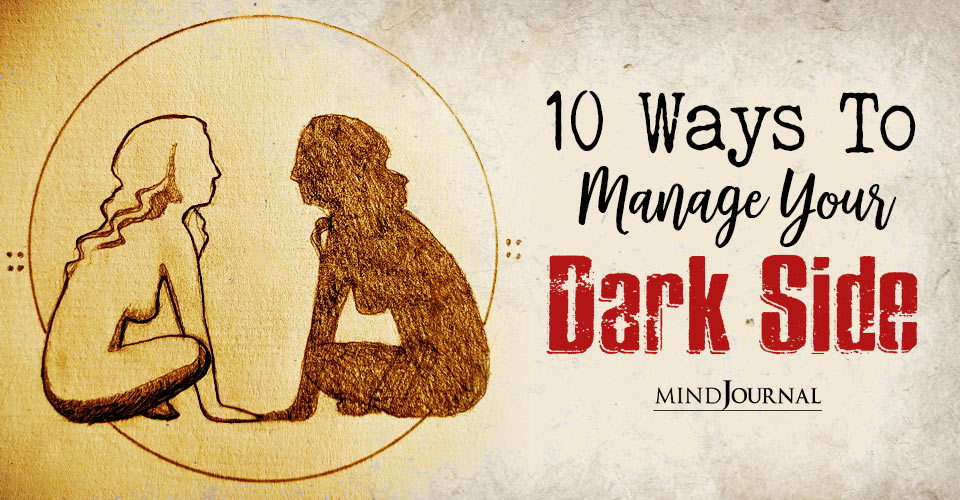Do you have a dark side? Of course, you do. We all do. But none of us ever talk about it because we are afraid and ashamed of it. If you are struggling to manage your dark side, then here’s how to get started.
When your dark side takes control
When your dark side is in control, you don’t recognize yourself. The dark side of your psyche gives rise to thoughts and feelings that make you afraid yet tempted. It distorts your thoughts and emotions, yet it feels so right. And perhaps this is why we are even more scared of our dark side. So we suppress it and keep it hidden away from the world, even our loved ones. But we know deep within us, within its confines, our dark side grows silently, patiently looking for a way out. And when it does come out, all hell might break loose.
But what is this dark side of personality that we have? What exactly is it that we try to hide so desperately? And how can you manage your dark side in a positive way?
What is your dark side?
Your dark side refers to the aspect of your ‘self’ that exists in the shadow realm of your personality. Also known as shadow self, it involves certain traits and qualities which we prefer to keep hidden and locked away as we feel ashamed of them. We believe that such ‘dark’ qualities are embarrassing and make us undeserving of love, respect and admiration from others. So, we refrain from revealing our dark side.
Related: Shadow Self: How to Embrace Your Inner Darkness
We associate our dark side with negative thoughts and emotions such as being angry, jealous, selfish, manipulative, dominating and judgmental. While we may consciously dislike these emotions and keep them buried deep within us, whether consciously or subconsciously, they are a natural part of us. No matter how much we try to ignore them or hide them, they will eventually come up, given the right circumstances. In fact, studies reveal that suppressing specific thoughts can make intrusive thoughts more intense and persistent. Another study found that “Although thought suppression is a popular form of mental control, research has indicated that it can be counterproductive, helping assure the very state of mind one had hoped to avoid.”
When you don’t manage your dark side, but suppress it instead, it can come out in the ugliest ways. And when our dark side suddenly reveals itself, it can significantly affect the way you think, feel, behave and act, leading to loss, distress, anxiety, emotional pain and undesired outcomes. However, as our dark side is an intrinsic part of ourselves, we can actually manage and control it, instead of suppressing it. Once we acknowledge and embrace our dark side, as opposed to keeping it hidden, we can experience contentment, fulfillment, happiness and even enlightenment.
How to control your dark side
The dark side of your personality is a part of your human experience. Here are some effective ways to control and manage your dark side:
1. Acknowledge your dark side
The first step towards managing your dark side is embracing it. It is only when you acknowledge and accept every aspect of your personality can you truly understand who you are. When you understand yourself, you can connect better with your inner self and become enlightened.
You simply cannot get rid of your dark side no matter how hard you try. Instead, you can uncover all the aspects of your dark side that you keep hidden and face it. Shed some light on your dark side and try to understand it – what is it driven by and what does it want? Do you have unfulfilled desires? Are your needs not being met? Do broken dreams cause frustration? Delve deep within yourself and look for the answers. Instead of feeling embarrassed and ashamed of your dark thoughts, emotions and desires, try to understand what pain lies behind the negativity.
Related: The Dark Side of Nice People
Accept the fact that your mind and personality has a dark or shadow aspect which you cannot keep hidden forever. The more you try to suppress it, the deadlier it will get when it explodes. Unless you want to unleash your inner demons, be honest and truthful with yourself and have the courage to accept your dark side. This will allow you to release all your negative emotions in a healthy manner and manage your dark side positively.
Researchers have found that accepting, rather than judging, our mental experiences may lead to “better psychological health, in part because acceptance helps them experience less negative emotion in response to stressors.”

2. Know your triggers
Once you start accepting your dark side, try to figure out what triggers your negative thoughts and emotions. Invest a good deal of time into reflecting over your dark side – why does it arise at specific times? What situations provoke it? Is it triggered by specific people or experiences? Try to observe and find out repeating patterns and similarity in experiences that lead to negative thoughts and toxic behaviors within you.
Related: How To Own Your Shadow Before It Owns You: 7 Helpful Exercises
Ask yourself why you act selfish in certain scenarios? Are such behaviors triggered by insecurities and fears? Do you feel threatened when your romantic partner gives attention to someone else? Do you have anxiety that makes you overly cautious? Are you highly sensitive or insecure? How do these triggers drive you to behave? Can you react positively to your triggers instead of reacting negatively due to your dark side? Reflecting on these questions will help you illuminate your dark side and help you find answers to better manage your reactions to triggers.
Identifying your triggers will also help you to improve your communication with your friends, family and anyone else who may be affected by your negative reactions. Once your loved ones are aware of your triggers, you can better manage your dark side and navigate your relationships.
3. Practice mindfulness
Accepting your dark side and identifying your triggers can help you develop better awareness of self, which in turn can lead to stronger self-control and healing. This can empower you to be your most genuine self and act accordingly. Moreover, it can also help to reduce the influence of the external environment, situations and people on your thoughts, emotions, behaviors and actions. This is the most vital step when you want to manage your dark side.
Related: How Mindfulness Can Improve Your Overall Mental Health
According to researcher and author John D. Kelly, IV, MD, practicing mindfulness can be an effective way to train our mind to identify negative thoughts when they arise and consciously use healthy coping patterns to overcome difficult situations. He explains that practicing mindfulness, gratitude & kindness can help us “combat the negative thoughts that bombard our brains throughout the day.” Mindfulness allows us to accept our dark personality traits and “disarm” negative thoughts.

Researcher John D. Kelly suggests that giving a name to your dark side is an excellent way to manage your intrusive thoughts. “It may be helpful to adopt a name for the seemingly stubborn negative chatter in your mind. For me, I refer to my negative internal dialogue as ‘The Voice’ and recognize it for what it truly is—thoughts conceived by the collective pain in my subconscious,” he explains.
When you give a name to your dark side, you practice mindfulness, which allows you to focus your attention on the present moment. While mindfulness may require some time and effort, it can help to reduce negative thoughts and emotions like stress, anxiety and depression and boost positive emotions like gratitude and satisfaction.
When you practice mindfulness through meditation, you are able to develop a calmer and quieter mind, leading to balanced thoughts. “When we are immersed in the present moment, guilt and anxiety dissipate. Negative emotions lose their hold on us,” he explains in another research paper. Mindfulness allows you to detach yourself from your shadow self, focus on the positive things and better manage your dark side and negative urges, desires, thoughts and feelings.
Related: Cultivate Presence: How To Practice Being Present In Your Life
Ways to manage your dark side
Most of us tend to be afraid of our dark side, so we want to suppress it, eradicate it, forget about it and heal ourselves. But the more we understand our dark side, we can realize that our dark side completes us – without it we will always remain incomplete. So instead of trying to get rid of it, you should learn to manage your dark side.
Here are a few simple ways for you to manage and control your inner dark side –
4. Talk to someone
Talk to a trusted loved one about how your dark side makes you feel. They can help you gain a new perspective and take a new approach to life
5. Practice self-love
Show yourself some love, kindness and compassion. Be gentle with your dark side and deal with it in a loving way, instead of observing it with fear.
6. See it as an opportunity to grow
If you want to manage your dark side, look at it as an experience that can teach you valuable lessons about yourself and help you grow and mature. It doesn’t necessarily have to be a negative experience.
Related: 8 Tips To Embrace Your Flaws And Fall In Love With Your Imperfections
7. Don’t fear the dark
When your dark side starts taking over you, pause and breathe. Let yourself experience the difficult thoughts and emotions that appear and accept the pain instead of rejecting it. Explore the painful emotions as part of the healing process, instead of trying to suppress it. Be courageous.
8. Take it lightly
Don’t give too much attention to your dark side and avoid taking it too seriously. Look at it as just another natural part of you. Owning it, instead of being ashamed of it will help you better manage it.
9. Practice shadow work

What is shadow work? Shadow work is a process that allows you to uncover hidden aspects of yourself in your unconscious mind which you keep hidden and suppressed. Exploring past trauma or sides of your personality that you see as undesirable can bring clarity in thoughts & unmet needs and help in personal development. This is one of the best ways to manage your dark side as anyone can do shadow work on their own.
Related: Shadow Work: How to Let Your Inner Demons Guide You
10. Consult a therapist
Talking to a psychotherapist or a counselor can also help you in addressing your dark side. A mental health professional can help you come to terms with abusive and traumatic experiences from your past. In fact, different therapy techniques have been found to be highly effective in managing negative thoughts and emotions in multiple studies.
Importance of understanding your dark side
What happens when you don’t understand, accept and manage your dark side? When you repress your dark thoughts, emotions and urges instead of dealing with them tactfully, it can distort and skew your mindset and personality leading to different personality disorders, mental health issues and addictions. It can even destroy your relationships with your loved ones, your social reputation and your career.
Researchers have suggested that suppressing negative thoughts and desires can result in psychopathology. In fact, thought suppression can lead to generalized anxiety disorder, depression, post-traumatic stress disorder (PTSD), obsessive compulsive disorder (OCD) and specific phobias.
Related: Shadow Self: 3 Ways To Embrace Your Inner Darkness
And this perhaps explains the classic case of Dr. Jekyll and Mr. Hyde, where the dark side of Dr. Henry Jekyll emerged as the distinct personality of the violent Mr. Edward Hyde. While most of us won’t necessarily be splitting into two distinct personalities, Robert Louis Stevenson’s Strange Case of Dr. Jekyll and Mr. Hyde is the perfect metaphor for explaining the difficulties in suppressing our dark side. So maybe this is the reason why we are so afraid of our dark side.
However, researchers have indicated that suppressing our thoughts is not the right way to deal with our dark side or to gain control over your life. You need to learn how you can effectively manage your dark side so that you can reach your fullest potential without unleashing the Mr. Hyde that resides within you.
Embrace your dark side
Even though you may see your shadow self as something you should be afraid of, there is no denying that it is a version of you that is not separate from your inner self. Your dark side makes you human – a rather flawed, imperfect human being who makes mistakes, learns from them and grows to be a better version of themselves.
While our dark side makes us vulnerable, it also allows us the opportunity to improve ourselves. You can manage your dark side simply by accepting it, aspiring to develop a positive mindset and living with good intentions. When done properly, most of us can build a happier life and healthier relationships. Yes, we might fall down at times, but we will rise up stronger each time.
Related: 6 Signs You Are NOT The Master Of Your Mind (And 4 Ways To Master It)











Leave a Reply